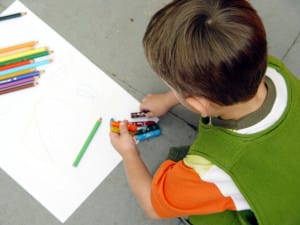Should Kindergarten be the new First Grade?
Posted by Brainspring on 19th Nov 2015
Hi everyone,
It’s been a while since I was able to post on Monday and Thursday. Did anyone else see this article from The Washington Post’s education blog? Delaying kindergarten until age 7 offers key benefits- study.
I can’t stop thinking about how much sense it makes, and I can’t stop wondering why education is moving in the opposite direction.
Delaying Kindergarten Reduces Inattention and Hyperactivity
The study found, “delaying kindergarten for one year reduced inattention and hyperactivity by 73 percent for an average child at age 11 and it virtually eliminated the probability that an average child at that age would have an ‘abnormal,’ or higher-than-normal rating for the inattentive-hyperactive behavioral measure.”
Delaying kindergarten allows students to better self-regulate and have better self-control, characteristics necessary to be successful in the school environment.
I found this question, brought up by one of the study’s authors, to be even more important than the data findings: “It’s not just a question of when do you start kindergarten, but what do you do in those kindergarten classes? If you make kindergarten the new first grade, then parents may sensibly decide to delay entry. If kindergarten is not the new first grade, then parents may not delay children’s entries as much.”
Do you think we are helping or harming our students by making kindergarten the new first grade?
Kindergarten Then and Now
What do you do in those kindergarten classes? It’s a question far too few people, aside from kindergarten teachers, ask. I distinctly remember tying my shoes and buttoning my coat being skills that were assessed when I was in kindergarten. I also remember lots of fingerpaint, playing with blocks and listening to stories. I didn’t have my own desk or even my own supplies. I only sat at a table when doing a project that involved cutting, gluing and coloring. Everyone at the table shared the supplies the teacher put in the middle and they were put away when we were done.
Now, kindergarten students are given standardized assessments covering academic skills that used to be in first grade. Many classrooms have center activities, but most are academic centers where students sit at desks, rather than centers where they build or pretend. Most kindergartners are expected to keep and manage their own books and supplies, and get reprimanded when they break their pencil or lose a crayon.
What we are expecting of today’s students requires more self-control and self-regulation that ever before, yet we are not giving them a chance to develop those skills. The positive effects of delaying kindergarten, or altering kindergarten expectations, could be enormous. Inattention and hyperactivity could be reduced 73%!
This is about more than the inattention and hyperactivity teachers face in the classroom though; this is about the well-being of the students. Kindergarten currently seems to be designed in a way that causes many students to struggle. Instead of starting out with a positive educational experience, many students are frustrated before they even enter 1st grade! We claim we want to encourage independent thinkers who are excited about learning, but instead we teach them that learning only happens when you are quietly at your desk with a pencil and paper.
Please share your thoughts in the comments below. I’d love to hear one thing you remember about kindergarten and one thing you noticed that has changed.
Remember to like us on FB, follow us on Twitter and LinkedIn and share us with your friends!
